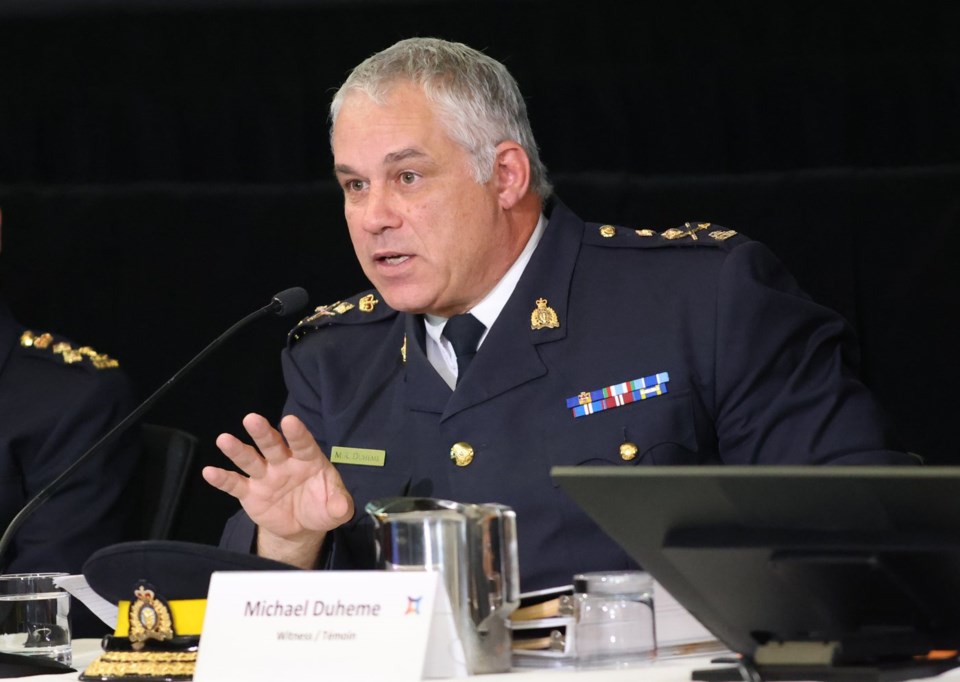OTTAWA ŌĆö As Canada looks to beef up its border security after president-elect Donald Trump threatened tariffs while raising concerns about illicit fentanyl pouring into his country, border officials pointed out there's barely any coming from Canada.
Though, none of them wanted to say the name Trump when they said so.
ŌĆ£Canada is not a significant source of fentanyl in the United States," said Aaron McCrorie, vice-president of intelligence and enforcement at the Canada Border Services Agency.
He made the comment to a House of Commons committee studying the impact of president-elect Donald Trump's plans for border security and migration.
McCrorie said border officials seized 4.9 kg of fentanyl in the first three quarters of the year, with the biggest amount being 4.1 kg bound for the Netherlands. The other seizures were all small, personal amounts caught along the land border, and there are no statistics to suggest significant shipments out of Canada.
CBSA President Erin O'Gorman also said the U.S. Drug Enforcement Administration has characterized the amount coming from Canada as "slippage" ŌĆö small amounts sent over for personal use, mostly by post.
Still, that doesn't trivialize the problem. Small package shipments are where CBSA is focusing its efforts, she said, which are hard to detect and can result in many lives lost.
Trump has threatened 25 per cent tariffs against Canada and Mexico unless the two countries step up on border security to tamp down on flows of illicit fentanyl.
During the presidential race, Trump also threatened to deport millions of undocumented people, stirring fears that could trigger an influx of migrants into Canada.
When questioned by NDP MP Alistair MacGregor about what Canada could face if Trump follows through and if the country's immigration detention centres are up to the task, O'Gorman said her organization does not have projections or estimates of what that could look like.
ŌĆ£We are prepared for a surge,ŌĆØ O'Gorman said.
Ottawa is compiling new measures to bolster border security through more staff and equipment in the face of Trump's tariff threats.
Prime Minister Justin Trudeau shared his border plan with the premiers during a Wednesday evening meeting, and Ottawa plans to add their suggestions into the soon-to-come package of measures.
Several media outlets have reported that the tab for that could surpass $1 billion, citing confidential sources. RCMP Commissioner Michael Duheme said he was surprised to see that figure bandied about in headlines, but he's not clear whether Ottawa will actually put that much into beefing up the border.
He would not share with reporters any of the specifics on his wish list -- or how much money he's asked for, saying the announcement is coming soon enough.
"You heard the minister in the past saying drones, helicopters, and we want to modernize everything we have with technological equipment and additional human resources," he said outside the committee room.
"We have drones right now that we use to patrol areas that are hard to get to and what not. We just want to modernize the equipment and go to the more advanced technology that they have so we can better secure the border."
An RCMP official said the police force currently has more than 900 drones and nine helicopters located across the country, with six helicopters that occasionally provide border surveillance.
Meantime, Alberta Premier Danielle Smith, when announcing Alberta's own new border security plan Thursday featuring a new patrol unit and drones, said the province doesnŌĆÖt support retaliatory tariffs and prefers the diplomatic route.
Saskatchewan Premier Scott Moe said he and other premiers support the need for stronger border security to deal with illegal migrants and street drugs.
ŌĆ£There is broad support to increase the investment in border security on behalf of 91įŁ┤┤s, not just because President-elect (Trump) has asked for it,ŌĆØ Moe said.
According to the CBSA, there are 1,200 ports of entry across the country staffed by approximately 8,500 front-line employees.
CBSA also employs over 200 criminal investigators and some 60 international officers at 40 missions in 35 countries abroad.
"The CBSA strategically dedicates its resources to address the threats that Canada faces while supporting the flow of legitimate trade and travel across the border," said CBSA spokesperson Rebecca Purdy.
In the past fiscal year, she said CBSA seized close to 51 million grams of illicit drugs, more than 27,000 banned weapons and almost 900 firearms.
This report by The 91įŁ┤┤ Press was first published Dec. 12, 2024.
-- With files from Chris Purdy in Edmonton and Jeremy Simes in Regina.
Kyle Duggan, The 91įŁ┤┤ Press



